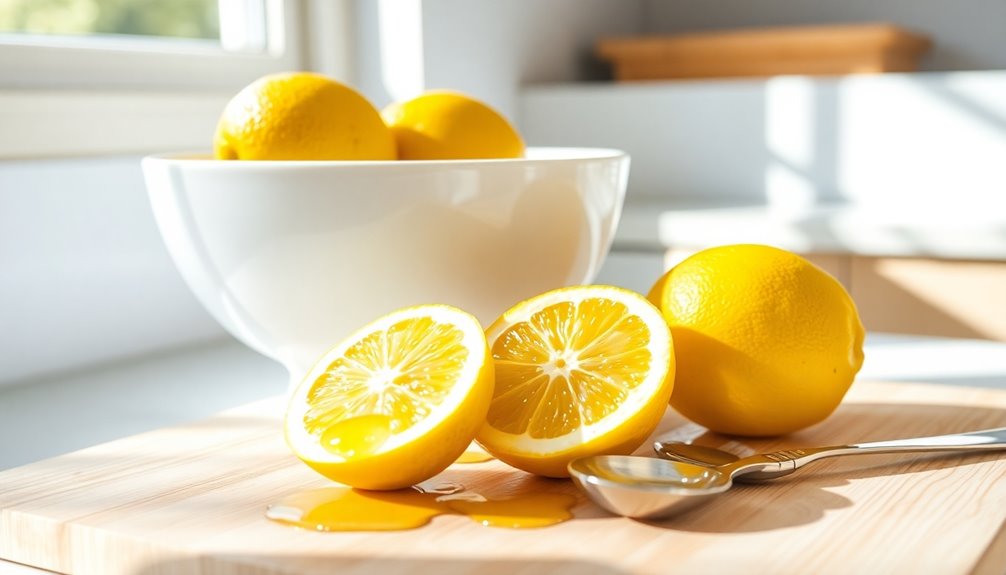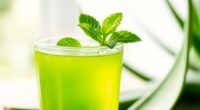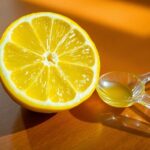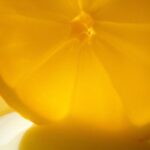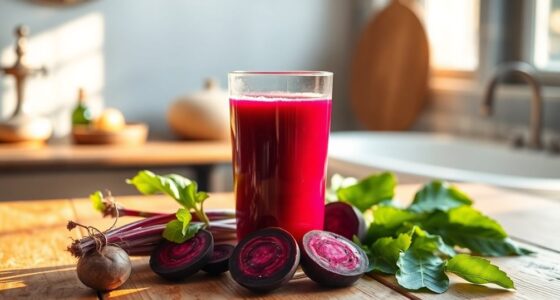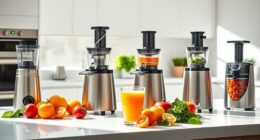When you squeeze half a medium lemon, you'll get about 1½ tablespoons of juice. If you're using half a large lemon, expect around 2 tablespoons. It's good to remember that the size and ripeness of your lemons can affect these amounts, so having a few extra lemons on hand is a smart move. Knowing these details can really help with your cooking and mixing tasks. Stick around to discover more tips on maximizing lemon juice yields!
Key Takeaways
- Half a medium lemon yields approximately 1½ tablespoons of juice.
- Half a large lemon produces about 2 tablespoons of juice.
- Whole lemons average around 3 tablespoons of juice when juiced.
- Lemon juice yield can vary based on the lemon's size and ripeness.
- For precise recipes, consider using a whole lemon if more juice is needed.
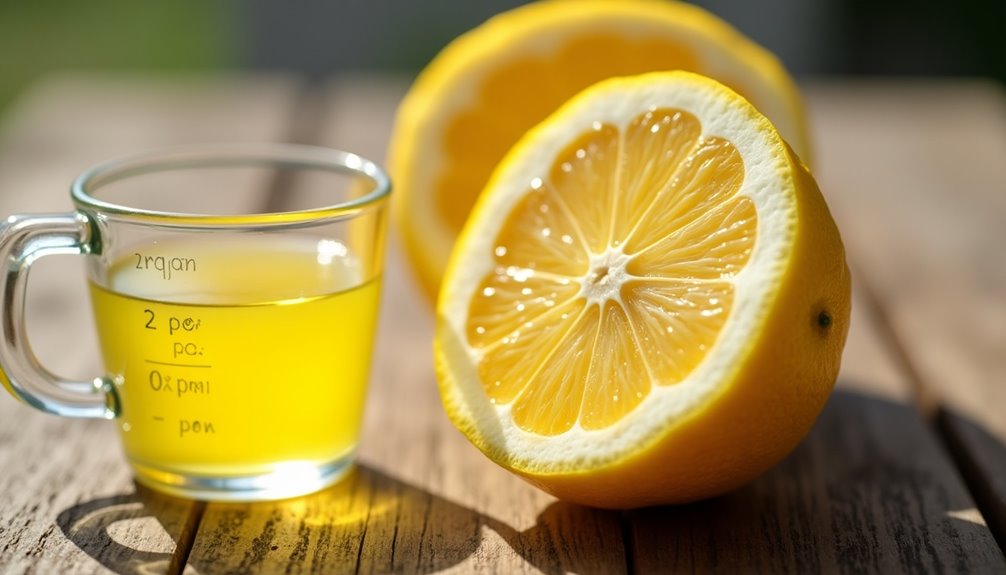
When you’re cooking or mixing drinks, knowing how much lemon juice equals half a lemon can save you time and effort. If you’ve ever found yourself in the middle of a recipe, only to realize you need the juice of half a lemon, understanding the typical yields can really help. Generally, when you’re dealing with a medium lemon, half of that fruit yields about 1½ tablespoons of juice. This measurement can be a game changer when you want to add that zesty flavor to your dishes or beverages without the hassle of squeezing multiple lemons. In addition to saving time, knowing how much juice is in a lemon can also help you avoid over- or under-measuring your ingredients, ensuring your recipes turn out just right. It’s also useful to remember that the size of the lemon can affect the yield; smaller lemons may yield closer to one tablespoon, while larger ones could provide up to three tablespoons of juice. Therefore, if you’re ever in doubt, it’s always a good idea to check how much juice is in a lemon before starting your culinary adventure.
Now, if you happen to have a large lemon on hand, you'll find that half of it yields approximately 2 tablespoons of juice. The size and ripeness of the lemon can significantly affect the amount of juice you get, so it's essential to keep this in mind. If you're working on a recipe that requires precision, you might want to have a few extra lemons available. That way, you can ensure you get enough juice without the stress of running short.
In most cases, a whole lemon averages about 3 tablespoons of juice. This measurement makes it easy to gauge how much you can expect when you cut a lemon in half. By knowing that half a medium lemon gives you 1½ tablespoons and half a large lemon gives you 2 tablespoons, you can plan your recipes accordingly.
If you find that you need a specific amount of juice, you can use these figures as a baseline. For instance, if your recipe calls for 3 tablespoons of juice, you can easily figure out that you'll need to use a whole lemon or a large lemon cut in half.
Sometimes, you might encounter recipes that don't specify the size of the lemon, which can be a bit confusing. In those cases, it helps to assume a medium lemon as your standard. This way, you can calculate that half the lemon will yield a reliable amount of juice to work with.
However, keep in mind the potential variations due to the ripeness of the lemon. A ripe lemon tends to yield more juice than an under-ripe one, so don't hesitate to squeeze a bit more if needed.
Frequently Asked Questions
Can I Use Bottled Lemon Juice Instead of Fresh Lemon?
Yes, you can use bottled lemon juice instead of fresh lemon juice, but keep in mind the flavor difference.
Bottled lemon juice often has preservatives and mightn't taste as vibrant as fresh juice. For most recipes, 1 tablespoon of bottled juice typically equals the juice from half a medium lemon.
You might need to adjust the quantity based on your taste preferences and the specific dish you're preparing. Always check the label for acidity levels.
How Much Lemon Concentrate Equals 1/2 Lemon?
When you're looking to substitute lemon concentrate for half a lemon, you'll generally want to use about 1.5 to 2 teaspoons of the concentrate.
Keep in mind that the flavor might differ, so it's a good idea to start with that amount and adjust to your taste.
Always check the label for specific concentration ratios, as they can vary by brand, ensuring you get the right balance for your recipe.
How Much Real Lemon Juice Equals One Lemon?
When life hands you lemons, you might wonder how much juice you'll get from one.
Generally, a medium lemon yields about 3 tablespoons of juice. If you're using a large lemon, expect around 4 tablespoons, while a small one typically gives you about 2 tablespoons.
What Is the Ratio of Lemons to Juice?
When you're figuring out the ratio of lemons to juice, remember that one medium lemon typically gives you about 3 tablespoons of juice.
If you've got a large lemon, you can expect around 4 tablespoons.
So, for every whole lemon, you can extract a decent amount of juice to enhance your recipes.
Just keep in mind that the size and ripeness of the lemon can affect how much juice you actually get.
Conclusion
So, next time you need the juice of half a lemon, just remember that about 1.5 tablespoons will do the trick. You might think fresh juice is always better, but using bottled lemon juice can save you time without sacrificing flavor. Imagine whipping up a quick salad dressing or a refreshing drink in moments. With this handy conversion, you can enjoy the zest of lemon in your dishes, even when you don't have fresh lemons on hand.
Cindy thoroughly researches juicing trends, techniques, and recipes to provide readers with practical advice and inspiration. Her writing style is accessible, engaging, and designed to make complex concepts easy to understand. Cindy’s dedication to promoting the advantages of juicing shines through her work, empowering readers to make positive changes in their lives through the simple act of juicing.

